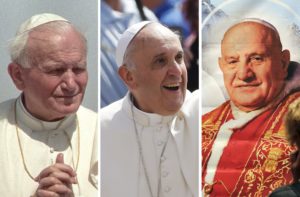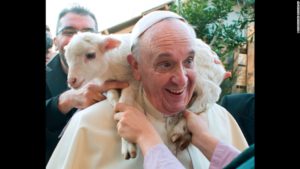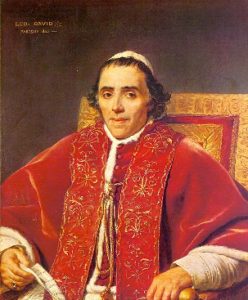
GMH/KM – RTRLD6Q
For Catholics, the Pope is considered the spiritual successor to the Apostle Peter. He is the Supreme Pastor of the Catholic Church, God’s steward ordained to authoritatively teach, unify, and protect God’s people, keeping them free from error and deception (CCC 882, 890).
The evidence that Jesus wanted to establish a spiritual leader for his church is in Matthew 16:13-19, where Jesus stated, “Blessed are you, Simon, bar-Jonah… I tell you that you are Peter, and on this rock I will build my church, and the gates of Hell will not overcome it. I will give you the keys of the kingdom of heaven; whatever you bind on earth will be bound in heaven, and whatever you loose on earth will be loosed in heaven.”
Note in this passage, that Jesus changes Simon bar-Jonah’s name to Peter. When a person in the Bible is renamed, it is a sign of God’s intention to work in a special way through that individual. Abram became the father of nations after being renamed “Abraham,” Jacob became “Israel,” and Saul was renamed “Paul.” The implication of Simon’s new name is easiest to understand when going back to Jesus’ native language, Aramaic. Unlike modern English and New Testament Greek, the Aramaic word for “Peter” and the word “rock” are identical: Kepha. So this verse, when spoken, would have sounded something like this: And I tell you that you are Rock (Kepha), and on this rock (kepha) I will build my church…
Also in this passage, Jesus states he will give Peter the keys of the kingdom of heaven. In Old Testament times, the steward of the palace was the king’s right-hand man, the second-in-command. When the king was away, the royal steward was keeper of the keys to the kingdom, ruling in the king’s stead. While he looked after the affairs of the kingdom, he never replaced the king but awaited his return. When the present steward died, another filled the position.

The office of the Papacy works in the same manner. Christ gave Peter governing authority over His Church by handing over the keys to His Kingdom. Like the ancient “key keepers,” the Pope is the steward awaiting the King’s return. Until Christ’s second coming, the keys will be passed on to each successor to the Papal office.
Now, what do the terms “binding” and “loosing” refer to? In this context, Catholics view Peter’s key-keeping status as one that makes him “Supreme Pastor,” with final authority over what is permitted and what is denied in matters of doctrine and spiritual discipline.
The issue of this final authority brings up an often misunderstood doctrine of Catholic teaching: Papal infallibility. Catholics believe the Pope has great authority in matters of the faith, but this doesn’t mean that Catholics believe that every word the Pope says comes straight from God.
Papal infallibility refers to the belief that while all Christians have personal access to the Holy Spirit in prayer, Christ promised a unique protection over the Apostles’ teachings, ensuring they would preach without error (John 16:12-15). In order for a papal teaching to be considered free of error or “infallible,” the Pope must, a) be speaking on a matter of faith and morals (not on his recent vacation plans) and b) make it clear he is speaking from the “Chair of Peter” and that what he is about to say is binding. These infallible statements are for affirming what has always been true and are not a method of creating new beliefs (CCC 86, 888-891). Official statements of infallibility are rare today – the last one was made in 1950, long before Pope Francis.
Another important clarification: Papal Infallibility refers to doctrine being protected from error, not the man holding the Papal office being free of imperfection or sin. Catholics point to Peter’s sinfulness as an example of failings in a Pope, and John Paul II was known to confess his sins weekly.
One last “key” element of Catholic teaching on the Papacy is worth mentioning. Catholics believe that in imitation of Christ, Peter’s successor is a shepherd called to embrace the biblical model of servant-leadership, earning him the official title “Servant of the Servants of God.” The sacrifices made of Pontiffs are often so great, that it is not uncommon for Popes to accept their appointment out of a sense of obedience instead of personal desire. So the office, while powerful, is meant to be authoritative in nature, not authoritarian like a dictatorship.
You may want to view a list of all the Popes from Peter to Present: Click Here

